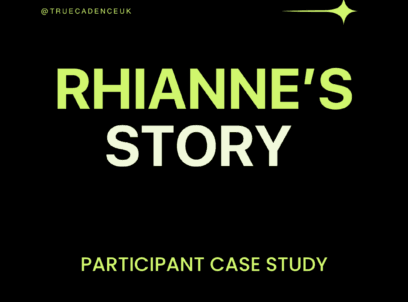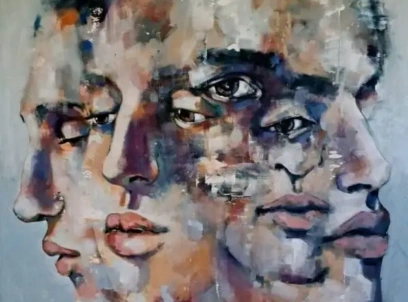Throughout his life, Scott has never been haunted by the notion of a single career path. Following his intuition and curiosity allowed him to explore diverse creative opportunities – from managing and hosting silent disco walking tours and directing a magic company to assisting in the Mayor of London’s Office. Yet, he had still managed to pursue a master’s degree in filmmaking whilst working and entertaining people during the late nights as a Drag Queen.
With the sincerity of an open book, Scott unfolds the daily realities of doing drag – the difficulties he has encountered on the street, what wearing the outfit feels like, and why Christina Draguillera is not a typical Drag Queen.
Speaking for True Cadence, Scott also hints at how drag dissolves gender stereotypes and explains why drag act is always political. He stresses the importance of respecting rather than accepting each other and elaborates on how his interest in mental health and helping the community led him to join True Cadence as a videographer.
What made you realise drag was your calling?
I came across it by accident. A couple of friends had set up a silent disco walking tour in West End theatre, so I started doing that, and then they said: we’ve decided we want to do a brand new tour and call it the Disco Diva tour with a Drag Queen, and I was like, where are you going to find a Drag Queen from and they said: we want you to do it! I’ve only ever done it for fun or at pride, but I gave it a go. I’m pretty confident, can talk to people, and love dancing and singing, although I’m not very good at singing (laughs).
What is the inspiration behind Christina Draguilera’s name?
Before I started doing drag professionally, a friend of mine had a drag party, and I thought I dress as Christina Aguilera in that song Lady Marmalade, with a tiara, big frizzy blonde hair and a few diamonds on the face. And then someone says: oh, Christina Aguillera, more like Draguillera – and that just stuck. It was given to me, and I loved it.
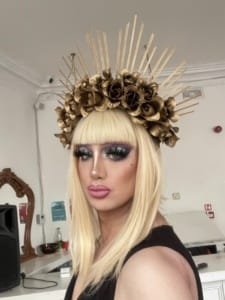
How different is Christina Draguilera from Scott Cheek?
RuPaul, the mother of all Drag Queens, says it’s like getting drunk for the first time when you put on drag. You don’t know whether you’re going to be a flirty drunk, a bitter drunk, an angry drunk, a sexy drunk, a funny drunk, or a crying drunk.
For me, my persona as Scott was always very confident. Of course, there are moments when I look in the mirror and say, “wow, girl, you look great” – there’s a bit more sassiness. It might be that you can get away with a lot more in drag. I could use the C word, and in drag, they laugh, but then, you say the same thing out of drag to the same person in the same way with the same intent and tone, and there’ll be offended. Maybe I push the boundaries a little bit more as Christina, but I’m a boundary pusher anyway.
“Whatever you want to put on your body should be up to you.”
What makes you an unusual Drag Queen?
Many Drag Queens will do a few songs, lip sync or a dance; they’ll be on for 45 minutes and go, whereas I’m probably the only Drag Queen you’ll find turning up an hour early. I’m always early and want to sit and chat with people. I want to learn more about who they are and where they’re from. London is the best place for it because you have so many people from different nationalities and backgrounds. We have over 200 official languages spoken in London – I find that so fascinating.
And another big difference – I can do my makeup. When I first started, it took me three hours to do it. Now, I can probably do it in half an hour. I’m doing it five nights a week, so I can’t spend that much time; I need to get into it.
Is your drag outfit comfortable?
(laughs)… No, it’s a simple answer. I always wear nothing shorter than an eight-inch heel. If I’m not wearing them, I feel really short. It’s bizarre because I’m six feet tall anyways; I’m still taller than everyone in the room. I don’t shave my legs, so I wear very thick tights; in the summer, it’s a nightmare. The corset is tight, so I often suffer from much pain. A wig can sometimes be too hot, and then you’ve got makeup caked on your face, your eyelashes are heavy, and on top of it, you’ve got to be funny and pleasant. Sometimes, the best thing about drag is getting out of drag (laughs).
How does drag challenge gender norms?
The origin of the word drag, which I believe in, is from Shakespearean times when women weren’t allowed to be on the stage, so drag is an acronym for dressing as a girl. It definitely is a swapping or realigning of gender stereotypes.
A Drag King Adam All says that we’re all born with a bag of bones and flesh. We cover certain parts with fabric to keep us warm and keep our dignity but making up these rules of what fabric should be worn by who seems silly. If a boy wants to wear a skirt and nail polish, or a girl wants to shave her hair and wear jeans, they can do the extreme. Whatever you want to put on your body should be up to you.
Can anyone be a Drag Queen, regardless of sex and gender?
Yeah, exactly. The term drag also has a broader meaning than hyper-femininity or masculinity. RuPaul says that everybody does drag. Drag is how you present yourself to the world. If you wear a fancy dress costume, you’re presenting yourself as a pirate, and when you’re doing typical Drag King or Drag Queen stuff, you’re presenting that aspect of us. It is political, whether you are a political person or not.
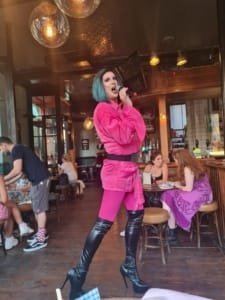
Have you had some negative experiences while doing drag on the street?
Yeah, there’s been a few negative experiences I’ve had. Nobody really does drag in the street. Mostly, people like to be in gay bars, and I don’t know whether anyone feels that safe on the street.
One time, I was waiting for a friend, and this group was growling and hissing at me. Another time, outside Hillsong Church on Tottenham Court Road, one of the members came out, a strong lad, and was like: what the f*ck are you dressed like that for? And it’s like, why having such an adverse effect for someone putting fabric on their body? It has no words, there are no slogans or anti-anything. It’s just me.
“It’s not important to me that you think you have the right to give me something that allows me to be me. I’m taking that from you. Yeah, I own that.”
How do you deal with heckling?
Growing up, I was bullied severely as a child. There comes a point where you go – I’m not doing that anymore. I’m going to stand up for myself, and nine times out of ten, people will back down. Quite a few times, guys and even girls will touch you inappropriately. A very drunk lady came up to me on Oxford street while I was doing a silent disco walking tour for a hen party of fifteen girls, and she started grabbing my fake boobs and then put her hand on my crotch. And at that point, I just pushed her away.
Is it important that your family and friends support your decision to be openly a Drag Queen?
I’ll tell you this, and the same goes for being gay, a Drag Queen, and in other areas of life where some people might not accept you – I don’t care. I don’t ask for your acceptance.
In one of her speeches, trans actor Dominique Jackson said: “I’m not asking for your tolerance. I’m not asking for your acceptance. All I demand is your respect.”
I feel the same when people say: How does it feel to be accepted? I never asked for your acceptance. I don’t need to, and I don’t want to. It’s not important to me that you think you have the right to give me something that allows me to be me. I’m taking that from you. Yeah, I own that.
Yet, some people may feel they cannot fully express themselves, so it must be empowering for you not to care what others think of you.
In an ideal world, you don’t need acceptance. However, it’s good to know that my family supports me, whereas some families might not. Whether you’re gay or anything, having support from your family and a support network for your mental health is always important.
“Many gay people growing up have been bullied and told who you are is disgusting, vile and abhorrent, so when you go into a new situation, there is anxiety always prevalent.”
In your Instagram post, you wore a stapled sign welcoming LGBTQ+ people from Ukraine. Do you also use your drag act to help the communities?
It was a reaction to how violence against LGBTQ+ people rose during the war in Ukraine. In the late 90s, Madonna produced a fabulous book called sex, and there’s one of her pictures where she’s naked on the street, hitching a ride. They put black squares over her boobs and vagina so that they could show it in the newspaper. I wanted to recreate that iconic image and make it political by saying: you guys are important too and are welcome here as much as any heterosexual family that has lived their lives in the “right way”. We were standing outside Downing Street, proudly saying – welcome.
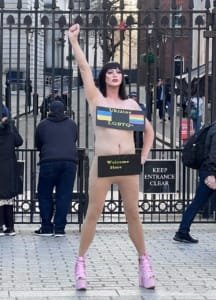
Was your desire to help people the reason you joined True Cadence?
Helping people was the main thing, but there was also a focus on mental health, which is close to my heart, as someone that suffers from anxiety. Another thing was inclusion – it didn’t matter if you were black, white, or gay. I had the interview with Manny and hadn’t mentioned at that point that I was a Drag Queen, but I felt comfortable with it; you could tell he was a great guy. I said yeah, by the way, I do drag, and he was like oh, my god, that makes you even more interesting; that was so cool of him to say.
Many gay people growing up have been bullied and told who you are and what you are is disgusting, vile and abhorrent, so when you go into a new situation, there is anxiety always prevalent – and hearing a man who goes, oh my god, that’s fascinating, that’s just great.
What has your volunteering experience as a videographer been like so far?
We usually started in the morning. I’d get up at eight, get there for nine, shoot all day, then go home, quickly shower, and drag till two or three in the morning. I was doing 19-hour days, but it’s not a sacrifice if it’s something you enjoy. And it’s such a joy to have worked with these young people. Two of them have been trans, as far as I’m aware. In terms of race, I think half have been white and half black, so it’s been perfectly balanced in terms of diversity. And secondly, they were all so talented – it’s been an absolute pleasure.
What do you enjoy the most about working with True Cadence?
Manny is the most important thing because you can see his passion, drive, and love for what he does. And his dedication. In a very short time, he’s positively impacted many young people’s lives and will continue to do so.
What’s next for you now?
On top of doing drag five nights a week, I have also set up my own event called “Matched by Drag Queens”. It’s a speed dating event hosted by Drag Queens. I’m also the director of two other companies: my friend‘s magic company and a management company we have together. He wrote a book about being a close-up magician, and we finished it together; I designed the front cover. Now it’s going to print, and we wanted to do a lecture tour.
While I love drag, by the time I’m fifty, I want to step back from it a little bit. I love it, and I would definitely do two nights a week. Ideally, what I hope to do in the future is spend more time with True Cadence and also help fundraise. If I can help that, not only does it help the organisation, but it also allows me to get a wage from it.
What message would you give to people who are afraid to be their true selves?
There was a movement called “It Gets Better”. It’s a message to say – be who you are, be out and open with who you are. And by doing that, you’re not only helping yourself, but you’re also helping the community as a whole. The more we’re present in society, the safer our community is, and we feel like we can express ourselves. There’s always that need to want to fit in and pick on anyone who doesn’t. As adults, generally, people grow out of that nonsense. I know many trans, queer and gay people living very happy lives. So what I would say is hang in there. Be yourself. It will get better.

